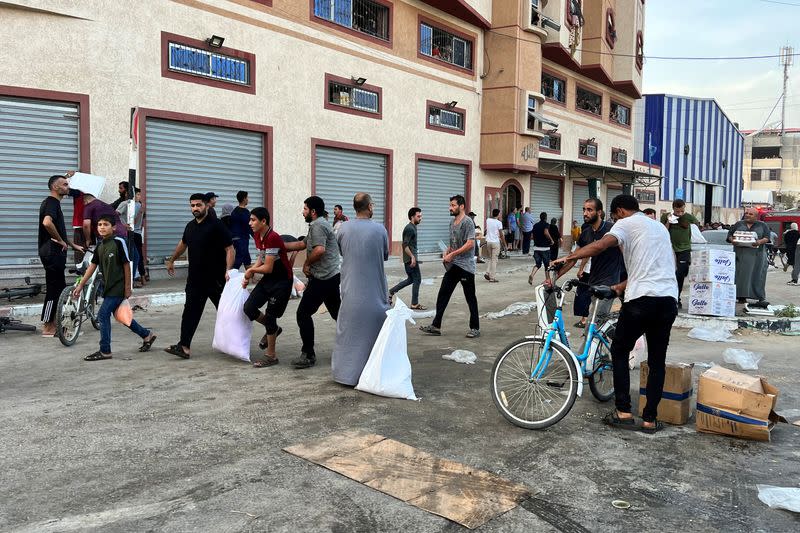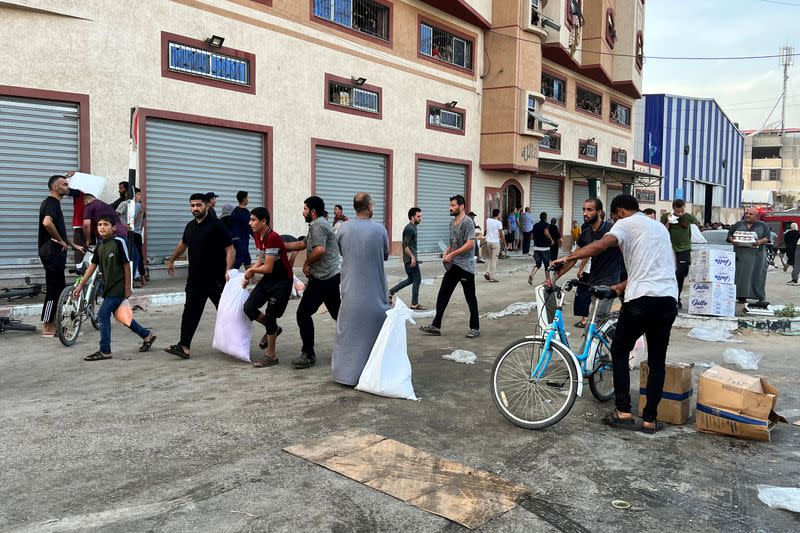Gazans at 'breaking point' as aid centres looted, UN agency says
By Gabrielle Tétrault-Farber
(Reuters) -Thousands of Gaza residents broke into U.N. warehouses on Sunday, grabbing flour and other essential items in a sign they had reached "breaking point", the United Nations Palestinian refugee agency (UNRWA) said.
One of the warehouses, located in Deir al-Balah in central Gaza, is where UNRWA stores supplies delivered by humanitarian convoys crossing into Gaza from Egypt.
Footage from Khan Younis in southern Gaza showed men frantically carrying boxes and large bags out of a warehouse, hoisting them onto their shoulders or loading them onto their bicycles.
"This is a worrying sign that civil order is starting to break down after three weeks of war and a tight siege on Gaza," the United Nations Relief and Works Agency for Palestine Refugees in the Near East (UNRWA) said in a statement.
Speaking to Reuters from Amman in Jordan, Juliette Touma, UNRWA's director of communications, said the scenes at the warehouses and distribution centres showed people's despair.
"This is an indication that people in Gaza have reached a breaking point," she said. "The levels of frustration and despair are really very high, and people are hitting rock bottom when it comes to their patience, their ability to take more."
Aid supplies to Gaza have been choked since Israel began bombarding the densely populated Palestinian enclave in response to a deadly attack by its ruling militant group Hamas on Oct. 7.
Touma said UNRWA had been forced to reduce the scale of its humanitarian operation in the densely populated enclave because it could not distribute fuel to some medical facilities. She said UNRWA had not received any additional supplies on Sunday.
"Those supplies are very, very little and they don't correspond to the huge needs on the ground," she said.
"We are asking for a standard and regular flow of humanitarian supplies, including fuel, and an increase in the number of trucks on these convoys."
UNRWA has said its ability to help people in Gaza has been completely stretched by air strikes that have killed dozens of its staff and restricted the movement of supplies.
"Fifty-nine colleagues at UNRWA were killed during the war," Touma said.
"This is only the number that UNRWA was able to verify and confirm. Sadly, the number of colleagues who have been killed could be in fact higher. We have also reports of people who are stuck under the rubble."
Even before the conflict, the organisation had said its operations were being jeopardised due to a lack of funding.
Established in 1949 following the first Arab-Israeli war, UNRWA provides public services including schools, healthcare and humanitarian aid in Gaza, the West Bank, Jordan, Syria and Lebanon.
(Reporting by Gabrielle Tétrault-Farber in Geneva and John Davison in Jerusalem; Editing by Alison Williams, Alexander Smith and Giles Elgood)

 Yahoo News
Yahoo News 

